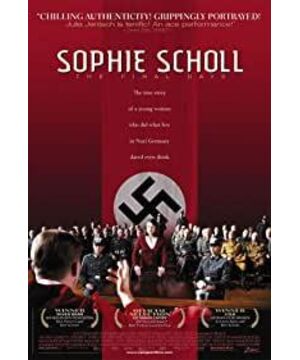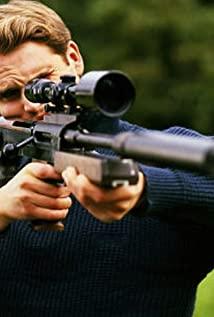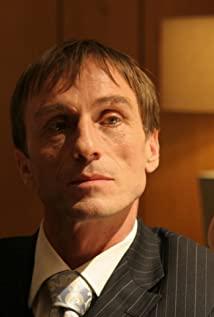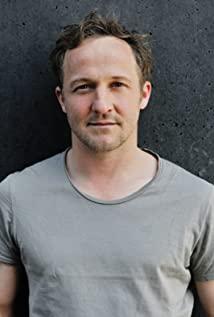Economic Observer.com
At the Berlin Film Festival in 2005, the German film "The Last Days of Sophie Scholl" (also known as "Hope and Resistance") won the Best Director and Best Actress Awards . The film is based on brothers and sisters Sophie Scholl and Hans Scholl, members of the underground resistance organization White Rose in 1943, who were arrested for distributing anti-war leaflets in a university building. Four days later, they were executed. Their companion Christopher.
"White Rose" is not even a "resistance group". At most, they distribute leaflets in public places, write slogans on street walls or put X on existing slogans. The main members are college students and a few university professors. A total of more than 100 people were arrested before and after, and 6 people were executed in two batches, including 1 professor. In that extreme situation, these people belong to the alternative existence.
There has been a movie about this before. This is "White Rose" filmed in 1982. It was translated by Shanghai Film Studio in 1984 and released in Chinese cinemas. Both films feature sister Sophie Scholl. We don't like a dedicated character because the light in her/him is too strong. However, the eye-opening glare is not what she/he did, not what extreme things these people did, but the power that was ultimately exerted on them, the power that took their lives, the cruelty and Appalling. It is unfair to extend the impression of the perpetrator to the people who were abused.
Completed in 2004, The Last Days of Sophie Scholl deserves attention. The director of this film, Mark Rothman, born in 1968, is equivalent to our sixth generation here. At the launch of the Berlin Film Festival, the director shared the idea of remaking the story: "At that time, thousands of Germans, including my grandparents, turned a blind eye to the Nazi atrocities, I hope to Analyse this phenomenon.”
Behind this seemingly bland statement, there is actually a storm of thoughts that people in Germany, Western Europe, and the intellectual circles in the United States reflect on the Nazi tyranny after the end of the Hitler regime. The fruit of many brilliant minds. In other words, the young man came from a different educational and intellectual background, probably unfamiliar to us.
How did all this happen? What kind of inspiration was this young girl, her brother and other companions standing with her, and where did she draw strength, and in a completely airtight situation, she felt that she had to choose the opposite. direction? On the other hand, what kind of power, what kind of system, what kind of law, what kind of operation, and who is in it, together to send a young life that has just bloomed to the guillotine?
Thus formed the style of film ideological debate. Unlike the previous "White Rose", which mainly described the hero's growth experience, the later one mainly focuses on the last five days of sister Sophie Scholl, during which time is mainly interrogation. The process of interrogation in the film is the process of debate. The interrogator and the interrogated are not on the innate moral commanding heights, but gradually open up an "equal" ideological war between them. There is no torture, no nerve warfare or psychological warfare. war. German actress Julia Yates (born in 1978) interprets the heroine born in the 1920s with incisiveness and precision.
The hero's "spirit" is not manifested as angry eyes, but calm and calm intelligence and self-confidence.
Rooted in life
when the director found the few pages of material in the National Archives (the Gestapo destroyed most of them), and was surprised to learn that, in the first hours of his arrest, Sophie Scholl showed "Like a professional liar. She's fighting for her life, she's pretending to be innocent, that the flyers that fell downstairs have nothing to do with her, she just pushed them out of prank. Go down." Likewise, her brother was rambling, and they all knew it was a matter of life and death.
Just as the director himself also mentioned, those random excuses in the material are not only not offensive, but become the most touching words, beyond his imagination. This view is startling at first. But if people also think that it is the only trace of a short-lived and erased life in this world, a person who is about to be swallowed by darkness, the body temperature left in this world, then watching such a dialogue, it is not easy to see It will feel trivial, and there will be a sense of wonder. First of all, you need to answer why you need to bring an empty box to the university. The size of this box is just commensurate with the size of the flyers that were later seized. Attempting to disentangle the box from the flyer is a "false" effort; however, surrounding this household item, it outlines the girl's life world.
She was going back to her parents' house in Ulm, because the last time her mother came, she took her clothes back to wash. "Don't go home at this hour, don't you go to class?" "I have to see a friend, she just gave birth. Besides, my mother is also ill." "Ulm is so far away, isn't it too hasty?" "Friend She made her plan to go to Hamburg ahead of schedule, and I also made a weekend trip ahead. I have already booked a ticket to Ulm at 12:48, and I also made an appointment with my sister's boyfriend to meet at the train station, don't believe you You can ask him."
The web of life she ripped out in one go shows that nothing in her life is isolated and abstract. She interacts closely with people around her. "Why do you have to come to school with an empty suitcase since you're going to Ulm?" She started to make up in another direction: she had an appointment with a girl named Gizera Shetlin, and now she has to go to school. to cancel. It sounded equally lighthearted and believable, in line with a girl's life — dating, canceling, re-dating, never tire of it.
"Then why did you bring your brother to the university?" To answer this question, he pulled out a bunch of messy details - "neurology", "psychology department", "philosophy professor Hu Bo took a class on the first floor and was looking for a girlfriend. Shetlin was in his class", "We arrived early, so we came to the second floor". Inquisitors need a very clear mind to sort out certain clues from a girl's tangled life. So does the audience.
To prevent her from committing suicide, an older female prisoner was sent to live with her in the cell. When it comes to whether the family will be affected, the girl immediately looks disturbed and frustrated. And when asked about her fiancé, she basks in bliss: he's "tall, dark-haired, and a free spirit. Always amuses me. Love, it's totally unconditional love, what a Wonderful." Even in the dark interrogation room, whenever possible, she turned her eyes to the blue sky outside the window. Her eyes were full of hope.
This is a stretched, full life, her contacts with the people around her, and his (her) relationships, all of which are alive. She is among him (her), surrounded by him (her) and around him (her), receiving care and giving her own care. For such a life, she did not know what indifference was, and had never experienced this emotion of failure.
She almost slipped through. But searching for his brother's room revealed the truth. Later, when excusing and clearing up her friends, she was replaced with another batch of real and trivial details, which made people feel that her life world was full and warm, poetic, and exuding endless charm. The world is both her own and the one that was built by her for generations. In it, the old laws of trust, fraternity, loyalty, solidarity still play an important role.
Hannah Arendt, who studies people's mental conditions during this period, pointed out that "loneliness" and "atomic individuals" are the root causes of people's loss of common sense and value judgments. Over time in "loneliness", people will become dull and numb, and then they will not distinguish between good and evil, right and wrong, and nothing matters.
Rooted in the system
, the director and screenwriter did a lot of homework for this film. They even tracked down the son of Moore, the interrogator who had interrogated Sophie Scholl, and listened to him describe his father's character. What Moore brought to his family was definitely not glory but humiliation. In the film, Moore mentions this son, who is working his life on the Eastern battlefield, even a year younger than Sophie Scholl. In any case, this Moore definitely didn't think that he had done such a thing. In his opinion, it was a trivial thing, not only to follow him forever, but also to follow his own generations.
Mr. Moore in the film has an ordinary appearance, a flabby body, and is slightly bald. Except when he roars occasionally, the rest of the time is calm, just like the neighbor who lives across the door from your house. In a place like a train station, no one would notice him. But it's the kind of people who, maybe, are doing something that, many years later, would seem appalling.
Of course, he wasn't a born demon. At some point, he even unabashedly expressed sympathy for Sophie Scholl. At first, when he couldn't find any evidence of Sophie Scholl, he breathed a sigh of relief, and even smiled at Sophie when he said "You might be able to go back to Ulm tonight" Return it with a happy smile. After the revelation, when Sophie asked: What will happen to us and whether relatives will also be implicated, Moore appeared helpless and powerless. Finally, when he was about to sign Sophie's investigation into a "serious anti-Party crime," he reminded Sophie carefully but very clearly, "Are you just believing that what your brother is doing is right and involving yourself in it? Among them?" His meaning was obvious, he wanted to exonerate Sophie, but was rejected by Sophie: "No, Mr. Moore, this is not the truth. I have no regrets and will bear the consequences alone."
But in the end, this The kindness that a person occasionally shows is only enough to take care of himself for a while. His focus is not on sympathy. What he mainly faces in this world is not people like Sophie. Sophie is just an episode and a passer-by in his work. What he has to face is the existing Order, his own place, the system into which he was programmed.
What if the system was also compassionate and humane at the same time. Then, one will not face such a dilemma: on the one hand, there are the requirements and instructions of the system, in front of which he feels small and powerless, and although he does not agree with it, he must implement it, because the final result Be sure to show up, there are people above who need to see. On the other hand, there is a residual sense of morality, shame, or something called conscience. They are not very strong, but they can be felt, and their voices can be vaguely heard, but in front of the system, They'd better stay hidden and feel like criminals.
Generally the two may not be so incompatible. But there is indeed such a historical situation where the conscience from the system and the conscience from the human heart have become two camps that are incompatible. This is the moment when people need to choose. It is best for people not to encounter such an obscure moment in their entire life, but sometimes such a moment is in front of people, unavoidable, very cruel and very embarrassing, and it is a huge pressure and test for everyone. People who choose conscience will naturally suffer and will not get any practical benefits, but will those who choose system be consummated? What about their own loss of humanity? What about the long-term catastrophic consequences of their history?
The system is abstract and indifferent, so people also acquire and share the nature of the system and become indifferent and abstract.
Moore acknowledged that the Scholls "took a peaceful approach." Sophie asked, "Then why are you punishing us?" "It's the law," Moore replied. He held the law in one hand and Sophie's small book in the other, put the former on the latter, made an alignment, and said, "As a criminal policeman, I have an obligation to check whether the provisions of the law are in line with the behavior of the people. If it doesn't match, find out where the problem is." The
director and his team even found information on the executioner, whose family has been in the business for eight generations. Hanging the Scholl brothers and sisters is a craft handed down from this man's ancestors. He never cared who was hanged. It was the same to him who was hired, but he remembered hanging 3,000 people in his life. He was as confident and courageous in the face of death as if he had never met someone like the Scholls and their comrades.
Rooted in conscience and truth,
what can make this inhuman system produce some ruptures? Inside its airtight iron barrel, there are some gaps?
Conscience and truth.
In response to Moore's claim that "the law" was used as a ruler to measure people, Sophie countered that the "law" he played with, "punishing people who speak freely with heavy sentences, prisons and death," did not lead to good order. Moore endorsed: "If you don't obey the law, then what should you obey? Obey the law, no matter who issues it."
Sophie replied: "It depends on your conscience." The interrogator took a deep breath and looked at her in confusion, as if he had never heard the word. "The law can be changed, but the conscience cannot." Sophie said clearly, "For my conscience."
That was the famous discussion. Claiming to be acting according to the "laws" and "rules" of the time was an afterthought for most Germans involved in Nazi atrocities. But this kind of law blatantly sends thousands of innocent people into the gas chambers of concentration camps, which is also not valid militarily. And how can such a savage order work? It relies on depriving people of the freedom of expression of their thoughts, and no one can raise objections, even if it violates the basic common sense in people's hearts and violates the most basic ethical bottom line of human beings - "don't kill people".
Compared with "don't kill people", freedom of expression is of course second. But when the order of killing is established, and one can criticize this order, freedom of expression becomes the first and indispensable, otherwise this order cannot acquire the ability to correct errors.
Sophie, who also participated in the German Girls League earlier, naively thought that Hitler would bring bread and happiness to people. The older brother, who returned from the front, brought back the truth that 3 million Polish Jews were imprisoned and killed: "Our reports will never have, all Jews of our age are imprisoned in concentration camps". And in his hometown of Ulm, there was a Jewish teacher. Before he was caught in the stormtroopers, everyone had to walk and spit in front of him. He disappeared that night, just like the one who disappeared in Munich in 1941. Thousands are the same. Friends of Sophie's mother also told her about the Nazi massacre of disabled children on trucks. The other children asked, "Where is the car going?" The nurse replied, "The car was going to heaven." Then the rest of the children sang and got into the car. As for Moore's statement that "these people are meaningless lives," Sophie said word for word: "No one knows what the soul of a mentally ill person is like. No one knows, that inner, spiritual maturity. , can be separated from the body. Every life has value."
For a highly totalitarian and highly repressive regime like the Nazis, unless there is an external force, such as war, it is difficult to have the force to change it, and it is impossible to expect it to correct itself. In the absence of external forces, unless there is an "internal revolution", that is, people begin to listen to their own inner voices, begin to search for their own conscience and morality, and at the same time overcome the fear, nihility and indifference caused by that extreme situation, The first step to liberation is to lift the spell on yourself by yourself.
Brother Hans wrote in the flyer: "We will not be silent, we are your annihilated conscience."
Rooted in interests and deceit,
don't think that people like Moore are really meticulously implementing the law and doing a conscientious job. screw, as he himself claimed. In front of Sophie, the "mask of the system" carried by Moore kept slipping off, revealing his personal face. In his sound of impeccable persuasion, a different voice was clearly heard, that of his own personal interests.
Moore claimed that he was from the Palatinate province of western Germany and was originally a police officer in the countryside. "If it hadn't been for this movement (Hitler) launched, I would still be a police officer in the countryside." Arendt once pointed out that Hitler's movement threshold Not high, once it needs loyalty, it needs to pull in some people with no faith. They tend to be grudges.
Sophie's father, a local mayor, was imprisoned for six months and removed from office for saying that Hitler was "God's punishment for the German nation." This was originally a carefree family. Thus, in Moore's view, the family and Sophie should thank Hitler for everything that exists, not against him.
Moore's resentment tilts his world, which in turn drives him to accept a tilted world. "You are privileged and you and your relatives took advantage of this shamelessly. You used our money to go to college during the war... and I only learned to kill". It doesn't sound like it has anything to do with any belief or ideology. Although Moore was never prepared to stand in front of the system as an individual, he couldn't help revealing his own existence, the foundations and secrets of his life, the contempt he had suffered, and he learned to despise others. "You all get food stamps like us, the people you despise. You have to live better than us no matter what. You don't have to say this at all, but you still have to."
From the perspective of personal comfort and comfort, Sophie really didn't need to take such a big risk. Sophie's actions, the elements that make up Sophie's motivation and spiritual world, are all beyond the comprehension of this man named Moore, who has never heard of them or seen a man act and behave that way:" I don't understand, with your talent, you don't think about it and you don't feel National Socialism"; "Why would a young man like you risk thinking like this?" "You have to adapt to a new era."
All these statements have cast aside the abstract system and its value, and use "individuals" as bait, more like a conversation between two "individuals". So far, not only Sophie and Moore's language are in a state of split, Moore's own language is also divided into two: on the one hand, what he calls "law" is the huge "inhuman system" that is not allowed to carry any individuals. But on the other hand, what supports this machine are all kinds of personal reasons, personal motivations, personal gains and losses, and personal fears. Do not do it.
The problem is that all these personal factors are hidden inside that huge machine, from the outside it looks like there are no people here, the machine itself is running, and everyone has to follow the instructions of the system, but in fact, the system is precisely It is the personal interests of many people who are looking for their own treasures in the system, and they use the system to protect their own interests, and at the same time express their own interests as the interests of the whole people.
Inquisitor Moore preferred to be selectively blind, motivated by covert personal interests. He said what Sophie said was "not reality" and that the missing Jews "chosen to leave", which he hoped to see from his position. He automatically excluded and filtered all the information that could not support his actions. Only in this way can he feel at ease. The judge who roared at the final trial, brother Hans, pointed out that he had never been to the front. The implication is that the basis for his judgment is only the propaganda of the rear, so it is not tenable.
Between Sophie and Moore, it is clear at a glance who is thinking of their nation. Starting from his own status quo, Moore decided to take a gamble, and he pinned his "hope" on the victory of Hitler's war: "If we win the final victory, you can live a free life. What will you say then? Sophie asked rhetorically, "
Do you believe in the victory of war? Do we want to be a nation that the whole world hates and forever excludes?" It is absolutely true that Inquisitor Moore and his colleagues entered "history" with the heroes in their own way.
Have these interrogators and judges ever had a moment when they were faced with this choice: if they had to go into history with their trial subjects, they could choose a more acceptable way for them? Especially in a way that his descendants seem more acceptable?
View more about Sophie Scholl: The Final Days reviews











